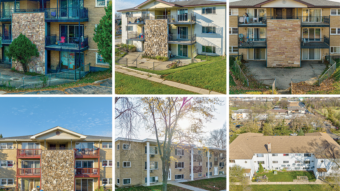Mark Long, senior vice president, principal and director of sales and leasing with Kansas City’s newly renamed Newmark Grubb Zimmer, has seen his region’s commercial real estate activity steadily rise. Today, Kansas City is in the middle of a full-blown commercial real estate recovery. Long recently spoke with Midwest Real Estate News about the reasons behind this increase in business.
Midwest Real Estate News: How strong is Kansas City’s commercial real estate market today? Mark Long: Commercial real estate business in Kansas City is definitely improving. We are seeing several sectors that are experiencing a lot of demand. One reason is the health of the auto suppliers here. Auto suppliers have rented more than 3 million square feet of space in the last 24 months. That has been a real shot in the arm for us. Obviously, we are benefiting from the investments, too, that the railroads have made in their intermodal operations. We didn’t realize, though, how much of a positive impact those successful auto plants would have in Kansas City on our industrial market.
MREN: Are there any other reasons behind the health of Kansas City’s commercial real estate market today? Long: Before 2008 when the market slowed, several developers had purchased parcels of land and improved them to the point where they were ready for vertical development. For a while, that was the marketing push for the Kansas City Area Development Council, that we had all these vertical-ready sites. We had an abundant supply. We are benefitting now from having those sites. And now we are seeing the spec buildings that have been developed on some of these sites getting leased. We are having success with these new spec developments.
MREN: Public construction has had a positive impact on the market, too, right? Long: You can’t overlook the impact of all the activity from the General Services Administration. (The Heartland Region of the General Services Administration is leasing about 140,000 square feet at the Two Pershing Square building in downtown Kansas City, with move-in planned for later this year.) Then there’s the U.S. Department of Agriculture, which is moving to a new building built by CenterPoint. (The USDA Animal and Plant Health Inspection Service is moving, again later this year, to a new 300,000-square-foot site at CenterPoint’s KCS Intermodal Center in south Kansas City.) Between those big deals and the success of the auto suppliers, the industrial market has been extremely robust here.
MREN: What is behind the success of the auto suppliers? Long: The auto suppliers are continuing their efforts to compete on a global scale. They are partnering more often with their vendors and suppliers. At one point, a big auto-supply deal in Kansas City might be a 100,000-square-foot deal or a 70,000-square-foot deal. That is changing. The deals are getting bigger. More auto suppliers are moving into bigger spaces. A couple of years ago, Comprehensive Logistics leased a building in a deal that was half-a-million square feet.
 MREN: What other sectors are doing well in Kansas City? Long: The multi-family sector is very robust in Kansas City. We have this new renter-by-choice classification where people are looking to rent instead of owning. Retail is seeing some good redevelopment taking place. The new IKEA store in Merriam is under construction now. That’s a big deal for us. A lot of people are excited about seeing that development. Retail is always active in Kansas City, and today is no exception.
MREN: What other sectors are doing well in Kansas City? Long: The multi-family sector is very robust in Kansas City. We have this new renter-by-choice classification where people are looking to rent instead of owning. Retail is seeing some good redevelopment taking place. The new IKEA store in Merriam is under construction now. That’s a big deal for us. A lot of people are excited about seeing that development. Retail is always active in Kansas City, and today is no exception.
MREN: How about the office sector? How is that performing? Long: The office sector has been slower to recover. But there hasn’t been a lot of new office buildings built in the region, either. The office sector is just kind of slowly picking up steam. We are excited to see the slow but steady improvements in that market. It’s still a very competitive market. Deals are tough to do if you are a landlord in that sector. The space that tenants are looking for is hard to find. There is not a lot of office buildings in Kansas City that have the modern design characteristics that tenants are looking for. That’s a function of our more conservative marketplace. As the office market gets better, we expect to see that change. We expect to see some new office buildings in the market.
Of course, the big question in our office market is always what is Sprint doing? For the time being, we aren’t seeing space become available. But the Sprint factor is always an important one. People are watching to see what Sprint will do. And if Spring does something big, that can impact the office market.
MREN: Are there any projects going on in Kansas that you’re particularly excited about? Long: We are all excited about the rise in advanced manufacturing companies targeting Kansas City. Those auto suppliers, for instance, are bringing good jobs. That is good for core employment in our city, something that will impact retail and residential in a positive way. We like the prospect of Kansas City being an attractive place for companies that are in advanced manufacturing.
The MindMixer deal we just landed is an example, too, of the tech companies that want to do business in Kansas City. (In April, MindMixer, an Omaha-based company that helps cities and other organizations better gather ideas from their community members, announced that it will make Kansas City the site of its national headquarters, creating 85 information-technology, software and programming jobs in the area by doing so.) That is a big deal. That company chose Kansas City to provide them with that tech workforce. When that core employment comes, all the other positive things come with it. We are looking forward to seeing more announcements like that in the future.



